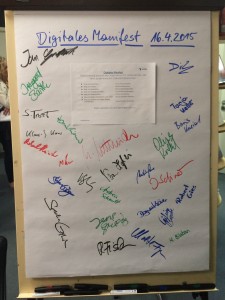What does digitalization have to do with agile? The Agile Usergroup Rhein-Main met at wibas in April to discuss this topic. The topic was examined and discussed in depth. At the end, the participants adopted a digital manifesto.
Digitalization, Industry 4.0 and Agile
First, the topic of digitalization was discussed in terms of content. Isn't everything already digital? Yes, many things are - but digitalization goes much further.
Digitalization and Industry 4.0 stand for the emergence of completely new business processes and models with the help of digital technologies. Digitization means a profound and comprehensive change. Old business models such as video stores or encyclopaedias are disappearing and being replaced by new ones: Netflix or online offerings are examples of this. But the fact that Apple and Google are among the most highly valued companies in the world also shows the change.
Digitalization has only just begun - and is a turning point. The Süddeutsche Zeitung has devoted a whole series of articles to the topic of "Digital Tomorrow". Articles dedicated. Digitization is also an important topic in the Frankfurter Allgemeine Zeitung. Topic.
The change is huge and far-reaching. Companies are no longer just being supported by information technology, they are being redesigned with it. The difference between traditional and new ways of thinking and acting was demonstrated, for example, by the introduction of self-driving cars. At the Detroit auto show in 2015, the major car manufacturers announced their intention to deliver self-driving cars from 2017. A few days later, the small new car manufacturer Tesla made it clear on its website: we are delivering self-driving cars immediately. The functionalities for this will be successively activated via software download. This is a good example of how not only the product itself is digitally different (it constantly updates itself), but also the product development process (functions are delivered early and regularly). While some are still waiting for the self-driving car, for others it is gradually becoming a reality.
For this change - and to really understand digitalization - the board of directors needs a "digital gene" in its DNA. However, digitalization also requires new skills - in the organization of digital companies. Top managers also recognize this. For example, the Economic summit the question "How does leadership work in the digital age?".
 These topics were discussed intensively in an open space. Afterwards, all participants agreed that the findings must result in a digital manifesto.
These topics were discussed intensively in an open space. Afterwards, all participants agreed that the findings must result in a digital manifesto.
Drawing up the Digital Manifesto
Digitalization needs Organization 2.0: companies that master dynamic and robust stability. These are companies that are characterized by:
- Away from silo thinking towards business process thinking.
- Away from heroes and towards collaboration.
- Away from specialists and towards interdisciplinarity.
- Away from dictating the "how" to self-organization.
- Away from knowledge islands and towards networking.
- Away from fixed working hours and locations towards distributed work.
- Away from stable and inert rules and processes towards flexible structures
This is what we work for and what we exemplify.
Digitalization needs agility
The final conclusion was that Organization 2.0 is an agile organization, because it needs the ability to react quickly in a complex digital world.
Book: Organization in a digital age
More on the topic can be found in the book "Organization in a digital age".

Comments
Write a comment